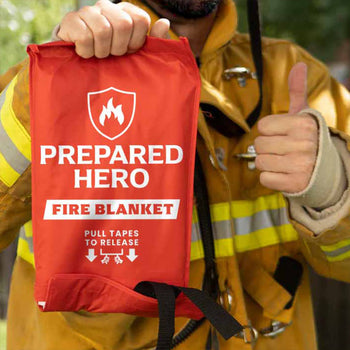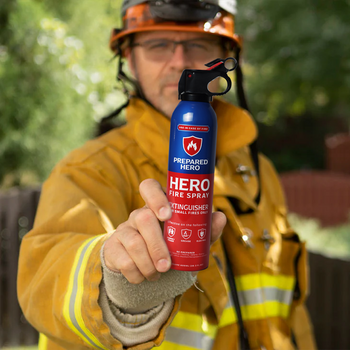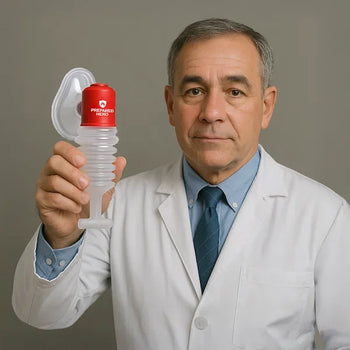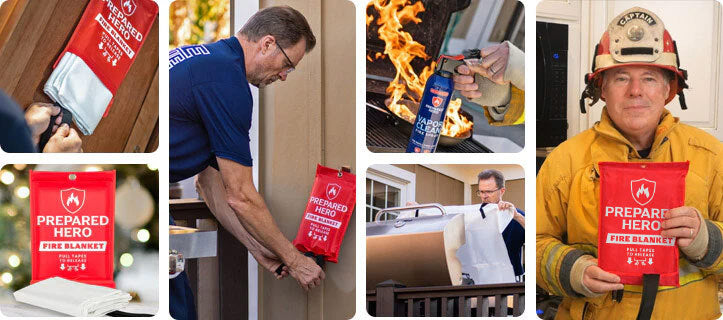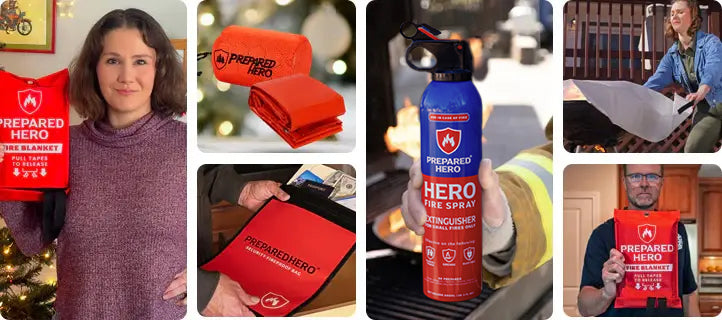Where you put your smoke detectors matters just as much as installing them. Proper placement makes sure they can detect...
HEPA filters have a reputation for keeping indoor air cleaner, but what sets them apart from other filters? If you’ve ever wondered how they work or how to pick the right one, you’re in the right place. This guide covers everything you need to know about HEPA filters.
What Is a HEPA Filter?

A HEPA (High Efficiency Particulate Air) filter, as officially defined by the US Department of Energy, traps tiny particles from the air.
According to the EPA (Environmental Protection Agency), it can theoretically remove at least 99.97% of pollen, dust, mold, bacteria, and other airborne particles with a size of 0.3 microns (µm). The 0.3-micron diameter refers to the MPPS (Most Penetrating Particle Size). Hence, bigger or smaller particles are trapped more efficiently.
In addition, MERV (Minimum Efficiency Reporting Values) ratings measure a filter’s ability to capture particles between 0.3 and 10 microns (µm). This rating is developed through a test method by the American Society of Heating, Refrigerating, and Air Conditioning Engineers (ASHRAE). It determines the performance of different filters. Higher MERV ratings mean better filtration for specific particle sizes. Here’s a table explaining different MERV ratings:
| MERV Rating | Average Particle Size (µm) | Efficiency |
| 1 to 4 | 3.0 to 10.0 | Less than 20% |
| 6 | 3.0 to 10.0 | 49.9% |
| 8 | 3.0 to 10.0 | 84.9% |
| 10 | 1.0 to 3.0; 3.0 to 10.0 | 50% to 64.9%; 85% or greater |
| 12 | 1.0 to 3.0; 3.0 to 10.0 | 80% to 89.9%; 90% or greater |
| 14 | 0.3 to 1.0; 1.0 to 3.0 | 75% to 84%; 90% or greater |
| 16 | 0.3 to 10.0 | 95% or greater |
HEPA filters are commonly used in air purifiers, vacuums, and HVAC (Heating, Ventilation, and Air Conditioning) systems. However, they’re not set-and-forget devices. They need to be cleaned or replaced from time to time. By doing this, your air stays clean and healthy to breathe.
How Does a HEPA Filter Work?
A HEPA filter cleans the air by trapping particles in a dense web of tiny, randomly arranged fibers. These fibers create a maze through which air has to pass. The maze is often made of glass or synthetic materials. As the air moves, particles get caught differently depending on their sizes.
Bigger particles are filtered through interception. They follow the airflow, but end up brushing against the fibers and sticking. On the other hand, medium-sized particles get trapped through impaction. This happens when they can’t follow the twists and turns in the airflow and crash into the fibers. Lastly, the smallest particles move in a random zigzag pattern, known as diffusion. This increases the chance they’ll bump into the fibers and get stuck.
Some HEPA filters also use electrostatic attraction, which pulls charged particles toward the fibers for extra efficiency. Plus, many systems include a pre-filter that catches bigger particles like dust or pet hair before they reach the main HEPA filter. It helps the filter last longer as well.
How to Choose a HEPA Filter

Choosing the right HEPA filter is crucial to getting cleaner and healthier air. Here’s how to choose a HEPA filter that meets your needs:
1. Know Your Needs
Start by thinking about why you need a HEPA filter. Is it for allergies, asthma, smoke, or just fresher air? Then, consider the size of the room you want to purify. A filter with the right Clean Air Delivery Rate (CADR) for certain pollutants and room size will work more effectively.
2. Look for True HEPA
Always choose a True HEPA filter, which traps 99.97% of particles as small as 0.3 microns. If you want extra protection, especially for health concerns, go for H13 or H14 medical-grade filters, which can capture smaller particles.
3. Check the Details
Are you using it in a bedroom or office? If yes, you might want to check its decibel rating. Certifications are also important. A MERV rating of 16 or higher is good, but CADR tells you more about how quickly it can clean the air.
4. Think About Maintenance
Filters need regular care. Some units have washable pre-filters that help the main HEPA filter last longer. You should also follow the replacement schedule set by the manufacturer.
5. Avoid Misleading Labels
Skip anything labeled “HEPA-type” or “HEPA-like” since they don’t meet proper HEPA standards. If the purifier has an ionizer, make sure it can be switched off to avoid ozone.
What Are the Disadvantages of a HEPA Filter?

HEPA filters trap tiny particles, but they’re not perfect. One of the biggest drawbacks is that they’re usually more expensive than regular filters. You also need to replace them regularly so they work well. That means ongoing expenses you can’t skip.
Maintenance is another factor. If you don’t clean or replace them on time, their efficiency drops as they get clogged with particles. While air purifiers with these filters trap dust, pollen, and other solids, they don’t remove gases or odors.
Some HEPA-based air purifiers can also be noisy, especially on high settings, which might bother you in a quiet room. Plus, their dense structure can make the system work harder and use more energy.
In short, HEPA filters are powerful for particle removal but come with trade-offs: higher cost, regular upkeep, no odor control, and sometimes extra noise or energy use.
Can a HEPA filter Cause Fires?
HEPA filters themselves don’t cause fires because they’re made from fibers designed to trap particles, not ignite. The real risk comes from a clogged filter. When airflow is restricted, an HVAC system has to work harder, which can cause parts like the blower or heat exchanger to overheat. In rare cases, that heat could ignite nearby flammable materials. Some air purifiers have also been recalled for fire hazards, but that’s usually due to faulty wiring or overheating electrical components, not the filter itself.
You can also lower the fire risk by replacing filters on schedule, making sure they’re installed correctly, and keeping your HVAC system in good shape. For air purifiers, stick with reputable brands that have safety certifications, and avoid using damaged units. Extra safety features, like automatic shut-off if the unit overheats, can also help.
Keep a fire safety kit with a fire blanket, fire spray, and flame shield in your home so you’re prepared to respond quickly if a fire occurs. If you want reliable, easy-to-use, and affordable tools to put out small fires before they spread, check out Prepared Hero’s fire prevention tools here. You can also get up to 51% off on certain items.
What is the Difference Between a HEPA Filter and a True HEPA Filter?

A True HEPA filter meets strict standards and is certified to remove 99.97% of particles as small as 0.3 microns. This means it’s been tested and proven to perform at that level.
On the other hand, regular HEPA filters or those labeled HEPA-like or HEPA-type don’t always meet these standards. They might still catch a lot of particles, but their efficiency can be lower, and there’s no guarantee they filter as effectively as a True HEPA.
The difference really comes down to certification and performance. If you want the highest particle removal efficiency, especially for allergies or asthma, go for a True HEPA, not just something with “HEPA” in the name.
What Is the Lifespan of a HEPA Filter?
A HEPA filter usually lasts six to 12 months in most air purifiers. However, this can vary depending on how and where it’s used. For instance, some HEPA filters in HVAC systems can last up to two years since they handle larger air volumes.
Factors like air quality, how often you run the purifier, and the type of filter also play a role in its lifespan. Checking the manufacturer’s guidelines and keeping an eye on performance will help you know when it’s time for a replacement.
What Are the Uses of a HEPA Filter?

HEPA filters are used anywhere clean air is needed. You’ll find them in air purifiers, HVAC systems, and vacuum cleaners. They help remove dust, pollen, mold, and bacteria from the air.
They’re also used in specialized places like cleanrooms and pharmaceutical facilities where tiny particles can cause problems. Since they capture 99.97% of airborne particles, they’re great for people with allergies or asthma, as well as for improving overall air quality in homes and offices. Whether it’s for health, comfort, or safety, HEPA filters play a big role in keeping the air cleaner.
Do HEPA Filters Remove Mold?
Yes, HEPA filters can remove mold spores from the air. Mold spores are usually between 2 and 10 microns, and a True HEPA filter can trap 99.97% of particles smaller than mold. This means most mold spores get captured before they can spread through your space. While HEPA filters help reduce airborne mold, they won’t remove mold growing on surfaces. So, you still need to clean and fix the source of moisture.
Which is better, UV or HEPA Filter?

HEPA filters and UV (ultraviolet) light systems work differently, so the better option depends on your goal. HEPA filters physically trap particles like dust, pollen, mold spores, and pet dander. On the other hand, UV light doesn’t trap anything, but sterilizes microorganisms like bacteria and viruses. The catch is that UV only works if the particles are directly exposed to the light.
If you want cleaner air free of both particles and germs, using a combination of HEPA and UV can give you the best of both worlds.
Can a HEPA Filter Be Washed?
No, HEPA filters shouldn’t be washed. They’re made of tightly woven fibers that trap tiny particles, and water can damage this structure, creating gaps that let pollutants pass through. Tests show that washing can lower efficiency by up to 23%, which makes the filter less effective.
There’s also the risk of mold. If a washed filter isn’t completely dry, it can become a breeding ground for mold, which can harm both the filter’s performance and your health.
Instead of washing, most standard HEPA filters are meant to be replaced every six to 12 months, or sooner if they’re clogged or your purifier’s performance drops.
Should I Sleep With a HEPA Filter?

Yes, sleeping with a HEPA air purifier can be good for your health. These filters trap allergens, dust, and other tiny particles, making the air cleaner to breathe at night. This can help reduce allergy or asthma symptoms and make it less likely you’ll breathe in irritants while you sleep.
Cleaner air can also lead to better sleep quality, especially if you’re sensitive to dust or pollen. Just make sure the purifier is the right size for your room and not too noisy to disturb your sleep.
What is the Highest HEPA Filter Grade?
The highest HEPA filter grades are H13 and H14. They’re also known as medical-grade HEPA filters. They perform better than standard grades like H10 to H12. For one, an H13 filter can capture 99.95% of particles as small as 0.2 microns, while an H14 can capture 99.995% of particles that size.
Due to their efficiency, they’re used in places where extremely clean air is needed, like hospitals, labs, and cleanrooms. You can also use them at home if you want maximum particle removal, especially for allergies or respiratory concerns. However, they’re more expensive than standard grade filters.
Should I Run My HEPA Filter All Day?

Yes, you can run your HEPA filter all day, especially if you have allergies, pets, or live in an area with high air pollution. Keeping it on makes sure the air stays clean instead of letting particles build up when the purifier is off. Most models are built to handle continuous use, but doing so means replacing the filter more often. It can also use more energy, so factor that in.
Conclusion
HEPA filters are one of the best ways to keep your air clean, whether at home or work. They trap tiny particles that can trigger allergies, asthma, or just make the air feel stuffy. Choosing the right type, keeping it clean, and running it regularly can make a big difference in your air quality and overall comfort.


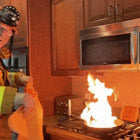 Fire
Fire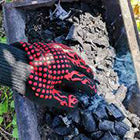 Safety
Safety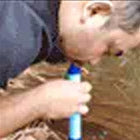 Survival
Survival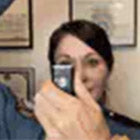 Protection
Protection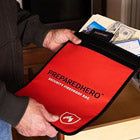 New
New
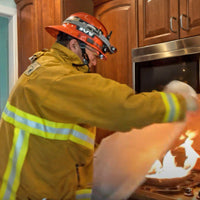 Fire
Fire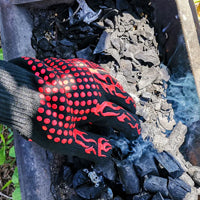 Safety
Safety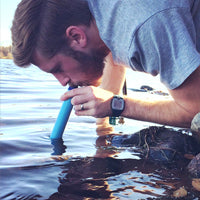 Survival
Survival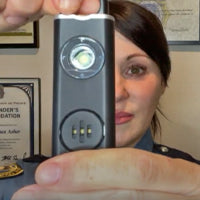 Protection
Protection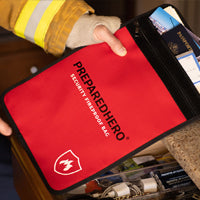 New
New
